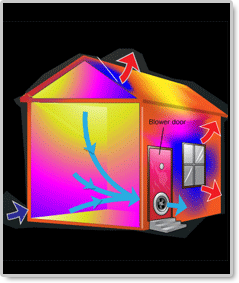Why NOT to Get a Home Energy Audit

REASON #1: Do not have a home energy audit if you are not interested in saving up to 30% on your energy bill.
An energy audit by a trained professional with special equipment and techniques can analyze your home, and determine the home improvements to reduce your energy bill. For some homes, these improvements can reduce energy bills by up to 30%. So if your annual energy bill is $2000, you could potentially save around $600 per year! A home energy audit can identify opportunities such as the potential benefits of adding additional attic insulation, replacing inefficient windows, upgrading older heating equipment and appliances. Yes, these improvements cost money, but the savings from them can pay back the investments in as little as 2-5 years on average. The cost of a good energy audit can range from about $200-300.
REASON #2: Do not do a home energy audit if the auditor does not have the proper referrals, testimonials, and qualifications.
A good energy audit requires specialized equipment such as a blower door and infrared imaging cameras. In addition to the necessary training for this equipment, an energy auditor needs to have learned how to analyze your home and its major appliance for energy efficiency. Do not do a home energy audit if the auditor cannot provide you with the proper credential, training certificates, etc. In addition, it is also important to check their references and to look at your state Attorney General’s website and your local Better Business Bureau for clues about past problems they may have had.
REASON #3: Do not do a home energy audit if the auditor wants to cut corners.
A good home auditor is trained to do a thorough job of analyzing your home’s energy usage and potential sources of energy loss. Tests that they should include are:
-
Blower-door test. The test uses a huge fan placed in an exterior door and super–sensitive measuring equipment to analyze home airflow and identify air leaks. The leaks could be in places you might never think to look. For example, behind built-ins, in the joint where the floor meets the walls, or in gaps created by recessed lighting or wall plates.
-
Infrared camera test. This test uses special camera equipment to visualize where heat is leaking from your home. This test can identify the need for additional weatherstripping, insulation, vent sealing, etc. Weatherstripping around doors and windows can cost as little as $50, and you can save this much in just 6 months.
-
Appliance inspection. By inspecting all of your energy-related appliances (heating, air conditioning, water heater, dryer, etc.) your auditor can estimate how much you can save by replacing this equipment with newer higher efficiency models. And sometimes it can be as simple as recommending a $20 insulation cover on your water heater that can save you at least that much in a single year!
-
Review of past energy bills. The auditor should evaluate at least a year of your monthly energy bills and your home use lifestyle, and be able to compare these to similar homes and situations. In addition to benchmarking your energy use, this can help identify the needs for items such as programmable thermostats.
REASON #4: Do not do an energy audit if the auditor is not able to give you customized solutions for your home.
All homes are built different and have their own unique issues. So, naturally, the solution should also be unique and customized for each particular home. Inexperienced auditors will give generic recommendations that are not particular to your specific home, geographic location, and lifestyle. A good auditor will provide you with a prioritized list of detailed improvements that you can make based on the tests and analysis they have done of your actual home. Before you select a home energy auditor, ask to see an example of a detailed final report that they performed on a home similar to yours (helpful accessories: The Energy Detective home power monitor; Kill-A-Watt electricity monitor; home energy audit kit).
REASON #5: Do not do a home energy audit if the auditor is more interested in selling you products.
You want your home auditor to be a trained professional, who knows how to analyze your home and make specific recommendations based on the particular need of your home, NOT based on what they happen to be selling. You want someone unbiased, and that keeps your best interests in mind. When you are evaluating them, check to see if they have a reputation for providing great service, or if they will say anything to sell their other products.
A home energy audit is a great way to find out how to lower your energy costs. Sometimes these improvements can even be eligible for tax credits and subsidies. In addition to savings that can payback in just several years, the upgrades can also make your home more comfortable and the newer energy-efficient appliances can have better features.
Related Articles . . .
Stop Paying for Electricity 'Vampires'
They are lurking in your home, and they attack while you are sleeping, when you leave . . . well basically, they attack all the time. It's the devices which continue to suck power, even when you have their switches turned off.
Where Your Home Energy Dollar Goes
Ever wonder where your energy dollars go in your home? This article shows you at-a-glance, so that you can focus on the areas that will give you the biggest bang-for-the-buck for reducing your home energy bill.
Kill-A-Watt Tips
A Kill-a-Watt electricity monitor is a great tool for helping you to identify ways to reduce electricity use around your home. Here are some tips on how to use this device.
How to Save $20 on Energy in April (or May)
This article and video describe very easy things that you can do, that will save you $20 on your energy bill during the months of April or May. And the nice thing is that these are all tips that you can do at little or no cost.
Programmable Thermostats Only Save If Used Right
Programmable thermostats can be a great way to save you money on energy, however, they can only provide savings when they are used properly. Find out how programmable thermostats work and the right way to use them.
14 Ways to Keep Cool AND Save Energy This Summer
Want to keep cool this summer and save money on your air conditioning bills? Here are 14 helpful tips. Some of these tips don't even cost any money!
Slaying Your Worst Electricity Vampire
Did you know that it can cost you more for the electricity to keep your DVR box in standby mode, than it does for your subscription fee? This article and video discusses a device that helps cut standby costs.











